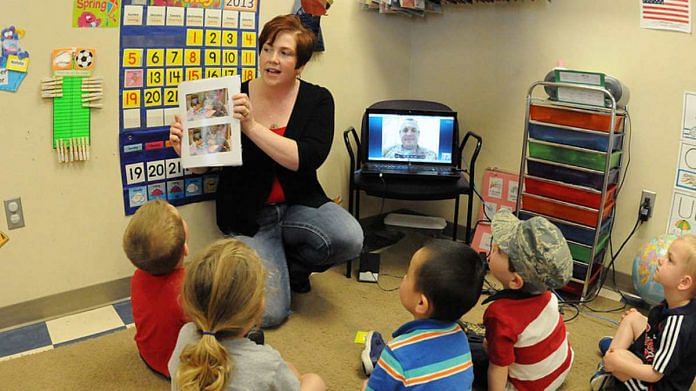New Delhi: A French study found low seroprevalence in children of daycare centres aged between 5 months and 4 years, suggesting they were not spreading the virus widely in such settings.
The study, published in The Lancet Child & Adolescent Health, suggested that Covid infection rates were low among these children, who attended 13 daycare centres across three French cities during lockdown — from March to May 2020.
Of the 327 children included in the study, seroprevalence was only 3.7 per cent with positive cases likely infected by an adult in their household, rather than while at the daycare, the study stated.
Published Tuesday, the study is the first to estimate seroprevalence in pre-school settings.
“Our results suggest that daycare centres are not focus points of SARS-CoV-2 virus infection and that young children are not spreading the virus widely in these environments,” said Dr Camille Aupiais, lead author of the study.
“These findings should be reassuring for parents and staff at daycare centres, especially given that the children included in the study have parents who are key workers and are thought to be at higher risk during the first wave of the epidemic,” added Dr Aupiais.
Also read: Children could have immune response to Covid without getting infected, Australian study says
Methodology
The study was conducted on 327 children, 197 daycare staff (average age 40 years), and a comparator group of 164 adults (average age 42 years), which comprised office and lab workers from six hospitals, who kept working during the lockdown and were not occupationally exposed to children at the centres or Covid-19 patients in their work settings.
Data collection took place between 4 June and 3 July 2020, four to eight weeks after the end of the first lockdown in France, which lasted from 17 March to 11 May. The samples were collected from Paris, Rouen, and Annecy.
What the study found
According to the study, seroprevalence was low among children, while the seroprevalence rate among daycare staff was similar to that of the comparator group of adults.
As many as 14 of the 327 children, 14 of the 197 daycare staff and nine of the 164 comparator adults were found positive for Covid antibodies. After adjustment for test sensitivity and specificity, these values were 3.7 per cent, 6.8 per cent and 5.0 per cent, respectively. Statistically, the seroprevalence rate among daycare staff did not differ significantly from that observed in the comparator group.
The 14 seropositive children came from all the 13 daycare centres. In the only centre, which had two seropositive cases, the children had attended separate zones of the daycare centre, suggesting that there was no child-to-child transmission.
The study also found that the seropositive children were more likely to have at least one seropositive parent compared to seronegative children.
As many as 55 per cent of the seropositive children had at least one seropositive parent in comparison to only 14 per cent of the seronegative children who had a seropositive parent.
“Our results suggest that young children are more likely to contract Covid-19 at home, rather than at a daycare centre,” said Dr Aupiais.
“We suggest that clinical signs of Covid-19 are not the best indicators of infection or for testing very young children and that the main criterion should be a suspected or confirmed case in an adult household member. Further research is needed to fully understand the role of young children in community transmission,” said Dr Aupiais.
The study, however, didn’t include the new variants of the coronavirus and also didn’t establish whether children are more or less susceptible to the newer strains.
Among other limitations, the study only included daycare centres that were not operating at full capacity due to the lockdown and results may not generalise to centres that were operating normally outside of lockdown.
Also read: Children are getting Covid sitting at home, reopening schools can help them & the community



